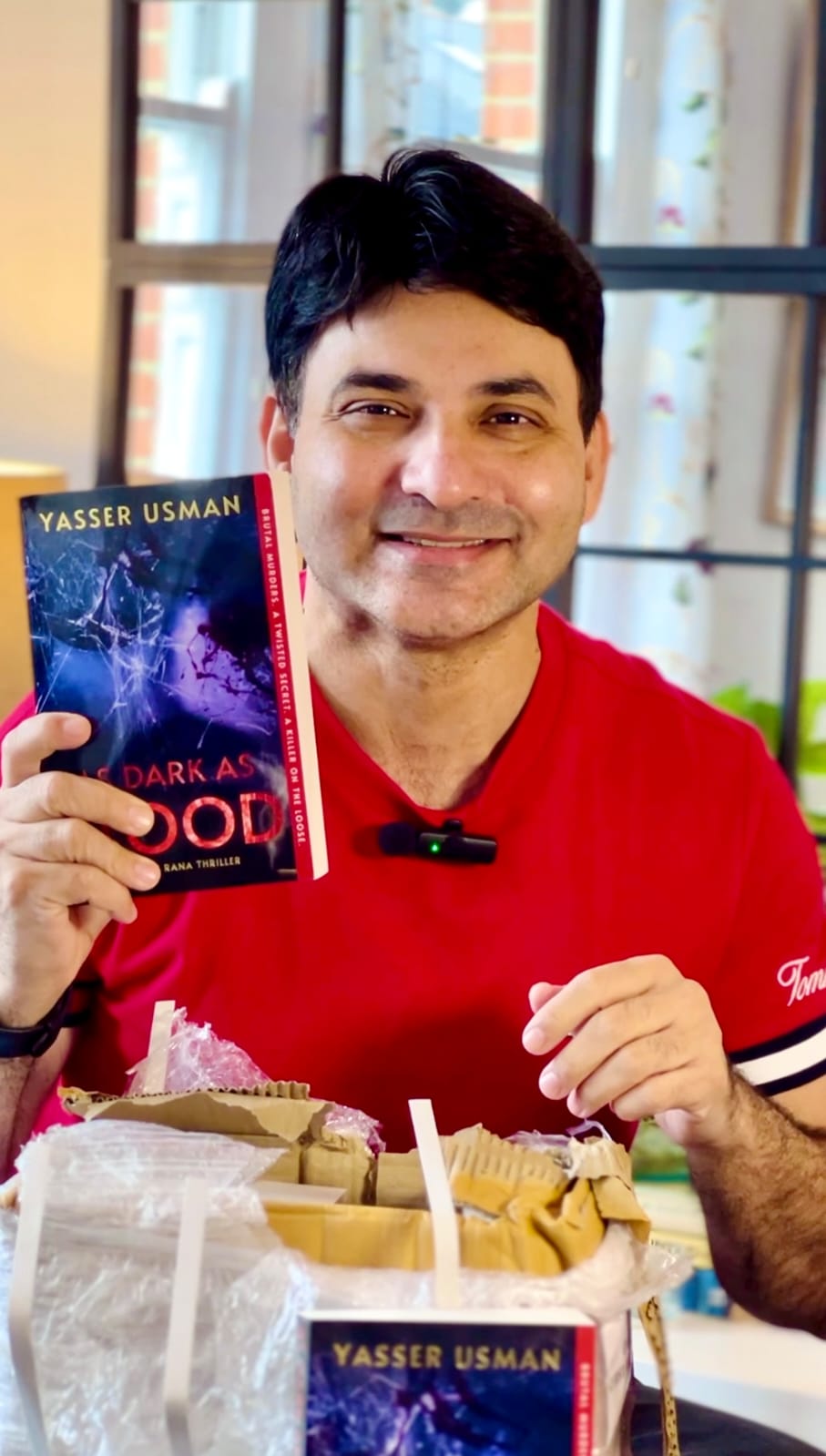From breaking news to in-depth biographies and now gripping fiction, Yasser Usman has seamlessly navigated the world of storytelling in its many forms. As a journalist, he reported on stories that shook the nation. As a biographer, he delved into the lives of Bollywood legends, uncovering the untold narratives behind the glitz and glamour. Now, with his debut fiction novel, As Dark as Blood, he takes on the challenge of crafting a compelling thriller—one that blends real-life crime with layered, emotionally charged characters. In this candid conversation, he reflects on the haunting stories from his journalism career, the art of balancing fact and fiction, and the raw complexities of human nature that fuel his writing.

Mili: What’s a story from your journalism career that still haunts or inspires you?
Author: There were many…but I still remember the infamous Nithari case in Noida, a gruesome story where horrifying details surfaced daily—stories of children going missing, only for their remains to be found in the most unimaginable ways. What made it even more unsettling for me was its proximity—not just to my workplace as a journalist, but also to my home. It made me realize that crime isn’t just about headlines—it hits differently when it unfolds in places you know, in streets you’ve walked. I think proximity turns it from news to something deeply personal. It’s one thing to hear about brutality from a distance, but when it happens close to home, it no longer remains just a story
Mili: You’ve transitioned from TV journalism to writing in-depth biographies and now fiction. How has this shift influenced your storytelling style?
Author: I’ve always believed that truth is not only stranger than fiction but also more powerful. The essence of storytelling remains the same, but the process couldn’t be more different.
In non-fiction, facts are sacred—untouchable, unwavering. That’s why, in my biographies, I make myself invisible as a narrator. No opinions, no embellishments—just the truth, laid bare. When you recount Sanjay Dutt’s tumultuous life, Rekha’s struggle, or Rajesh Khanna’s meteoric rise, you don’t need to shape the story; it already exists. Your job is simply to present it with clarity, to let the facts speak for themselves.
Fiction, on the other hand, is creation. You breathe life into characters, but once they exist, they take on a will of their own. They grow, they falter, they find their own destinies—while you, the writer, walk alongside them, discovering the story as they do. It’s an entirely different thrill—not uncovering the truth, but in a way, inventing it.
Mili: Your books often explore the untold sides of celebrities. What draws you to uncover these hidden narratives?
Author: I think my fascination with Hindi cinema is the driving force. I’ve watched these stars rise, fall, and endure, with admiration and curiosity. Being a star isn’t as glamorous as it seems—it’s a volatile, unpredictable world. The meteoric highs, the crushing lows—they leave a mark on anyone who experiences them. But beneath the glitz and the gossip, they are, like us, human. In my narratives, I aim to strip away the mystique and reveal the raw, emotional truths beneath, humanize their enigma into something deeply relatable. It’s about connecting with the heart of the story. Make it more emphatic….about human emotions.
Mili: In an era of digital journalism and social media, do you think long-form storytelling—like biographies—still holds the same power?
Author: I choose to believe it does. Short-form content may grab attention for a moment, but it is the long-form narrative that truly captures the essence of a story, allowing us to connect with the human experience on a deeper level. There’s a power in delving deep into a person’s life, understanding the layers that make them who they are, and exploring their journey in all its complexity.
Mili: As Dark as Blood is your first fiction book. What was the biggest challenge in shifting from biographies to fiction?
Author: To create characters that felt authentically Indian, characters who would resonate deeply with readers, not as replicas of Western archetypes, but as individuals rooted in Indian culture, with distinct mannerisms, thought processes, and motivations.
Creating a character like Roshan Rana, my protagonist in As Dark as Blood, was one of the most challenging and fascinating parts of transitioning from biographies to fiction. Roshan is complex—he’s not your typical hero. He’s deeply flawed, carrying a strong homophobic bias that makes him an imperfect person, yet at the same time, he is an exceptionally skilled investigator with a sharp mind and an unwavering moral compass.
The challenge was to make Roshan believable without falling into the trap of making him a simple, one-dimensional character. His flaws and biases are not just aspects of his personality—they’re integral to his journey. I had to dig deep into his internal struggles and show that, underneath the surface, he’s grappling with his own contradictions. There’s a vulnerability to him, an emotional depth that complicates his character in a way that makes him more human. His personal evolution throughout the story is what makes him compelling—a character who reflects both the darkness and light that exist within us all.
Mili: Without spoilers, can you share a moment in the book that was particularly difficult for you to write?
Author: The mob lynching of an important character and the father-son car scene are, without a doubt, my favorite moments in As Dark as Blood. On the surface, they may seem like simple scenes, but for me, they were incredibly difficult to write for a variety of reasons.
The lynching scene is crucial, not just because of its shock value, but because it symbolizes so much more. It’s a moment that exposes the rawness of human cruelty and the brutal consequences of unchecked hate. Writing it required me to dig deep into the psyche of the characters involved—their motivations, their emotions, and their actions. The complexity of this scene was that it wasn’t just about physical violence, but also about the psychological violence leading up to it.
Similarly, the father-son car scene is a simple moment, really—a quiet conversation between a father and his son during a car ride—but it’s so much more than that. It’s about unspoken words, buried emotions, and a lifetime of unaddressed issues between the two. Crafting the dialogue and the emotions felt like walking a tightrope—I didn’t want to overplay or over-dramatize, yet I needed it to come through strongly. The emotional depth and the subtleties of their relationship made it hard to strike the right balance.
Both scenes stand out because they represent key emotional turning points for the characters, and capturing those moments of raw emotion, vulnerability, and intensity was not easy.
Mili: Since you’ve written real-life crime stories before, how did that experience help in crafting the suspense in As Dark as Blood?
Author: The investigation and procedural aspects of the story were familiar terrain for me, as I’ve written about real-life events before. However, what truly challenged me as an author was delving deep into the characterization and emotional core of the characters. It was a new experience, one that required me to understand their innermost conflicts, motivations, and growth. Crafting their emotional journeys, especially when dealing with complex feelings and contradictions, demanded a different kind of storytelling. Balancing the intrigue of the investigation with the vulnerability of their personal stories…that was the real challenge.
Mili: Bollywood has changed drastically over the years. Is there a modern-day star you think deserves a biography?
Author: I would love to see Jackie Shroff’s memoir in his distinct style…he had a fascinating journey.
Mili: Did your experience as a journalist influence any of the characters or themes in this book?
Author: Many events in the book are inspired by real-life incidents, and indeed, my journey as a tv journalist has deeply influenced the story. The way I approach details, the structure of the investigation, and the nuanced portrayal of characters are all shaped by my experiences in the field. Additionally, media plays an important role throughout the narrative, almost acting as a character in its own right. It shapes the course of events, influences public perception, and adds layers to the story.
Mili: If you had to recommend one book (not your own) that shaped your writing, what would it be?
Author: I would recommend Sapiens by Yuval Noah Harari. While it may not have directly influenced my writing, it is one modern book that has certainly inspired me to think critically about human history and the evolution of societies.
Mili: If you could go back and rewrite one of your books with new insights, which one would it be and why?
Author: I don’t think I’d want to rewrite any of my books. Once published, a book becomes history, and history
shouldn’t be altered.
Whether dissecting the enigma of Bollywood’s biggest stars or unraveling the psychological depth of his fictional characters, Yasser Usman’s storytelling is driven by an unrelenting quest for truth—both the kind found in headlines and the kind buried deep within human emotions. As he ventures into the world of fiction, it’s clear that his ability to blend sharp journalistic precision with deeply resonant narratives makes As Dark as Blood a thrilling new chapter in his literary journey. And if one thing remains certain, it’s that his stories—whether fact or fiction—will continue to leave an indelible mark on readers.
Buy the Book Here
Share the post with your dear and near ones:




